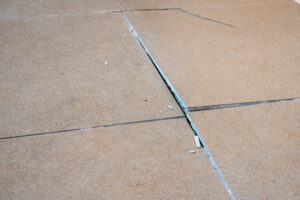For the budget-conscious—and aren’t we all these days?—It’s tempting to go for the lowest bid when you’re searching for tile installation contractors, but the cheapest option isn’t always the best. In fact, it might even be more expensive in the long run!
The Three Risks of Cheap Tile Installation
The right tile installation contractor makes all the difference, whether you need professional tiling for high-end hotels and commercial buildings, or luxury homes and condos. When you skimp on tile installation costs and go with the lowest bid, you’re typically sacrificing either schedule or quality, or both. That can have downstream effects you might not be prepared for, including higher costs of maintenance, repair, or replacement that cancel out your upfront cost savings and time on the jobsite.
Subpar Workmanship
When it comes to craftsmen, you pay for the experience. This is just as true for tile installation contractors as it is for any other trade. Sometimes, the lowest bids come from less experienced and less skilled contractors that may never return if there are issues.
They might not be up to the task of providing the quality tile installation your building needs to make occupants feel comfortable and at-home—risking uneven tiles with poor alignment or inadequate grouting that make your building’s floors look dirty or cheap, turning off potential customers or residents and potentially even reducing the real estate value of your property.
Inferior Materials
When you go for the lowest bidding tile installation contractor, the cost is being cut somewhere. Sometimes it comes from substandard materials, or underpaid employees, and worn out equipment.
Cheap base grade installation products can lead to cracking, chipping, loss of bond or grout discoloration and shading. Nothing lasts forever, but inferior products usually have significantly reduced life spans compared to more high-quality materials. Since they may not last as long, your upfront cost savings get eaten up by excessive repair and maintenance costs. Your tiling might not also be guaranteed by a manufacturer’s warranty.
Less Attention to Detail
Sometimes, going for lower tile installation costs means important things get overlooked during the job, leading to issues such as improper water drainage or time/cost overruns.
The former can result in mold or mildew taking root and jeopardizing the health of your building’s occupants, requiring urgent and expensive repairs. The latter can lead to your project going over time and over budget, negating your cost savings.
What Goes Into Tile Installation Costs?
Choosing the cheapest tile installation contractor may lead to time and cost overruns, more expensive repairs and maintenance, or reduced property values. Any one of these factors can actually make a lower tile installation cost into a bigger hit to your pocketbook in the long run.
When you choose a quality contractor like Brooks Tile, you’re choosing:
Professionals with decades of tile installation experience
The highest quality tile installation materials and methods for quality and lasting project
Impeccable attention to detail
For over 40 years, Brooks Tile has specialized in reliable tile installation with a focus on quality, loyalty, and integrity. When you need the job done right, you know who to call:
FAQs
Why should I choose a quality tile installation contractor instead of the cheapest option?
Going with the cheapest tile installation contractor can lead to subpar workmanship, inferior materials, and less attention to detail. This can result in higher costs of maintenance, repair, or replacement that cancel out your upfront cost savings and time on the jobsite. Choosing a quality contractor ensures that you get professionals with decades of experience, the highest quality materials and methods, and impeccable attention to detail.
What are the risks of going with the cheapest tile installation contractor?
The risks of going with the cheapest tile installation contractor include subpar workmanship, inferior materials, and less attention to detail. This can lead to higher costs of maintenance, repair, or replacement that cancel out your upfront cost savings and time on the jobsite. It can also result in issues such as improper water drainage or time/cost overruns, which can jeopardize the health of your building’s occupants, requiring urgent and expensive repairs.
How do I choose a quality tile installation contractor?
To choose a quality tile installation contractor, look for professionals with decades of experience, the highest quality materials and methods, and impeccable attention to detail. Check for reviews and testimonials from previous clients, and ask for references and examples of previous work. A quality contractor will be happy to provide all of this information, and will work with you to ensure that your project is completed on time and within budget.
What should I expect from a quality tile installation contractor?
A quality tile installation contractor should provide professionals with decades of experience, the highest quality materials and methods, and impeccable attention to detail. They should also provide excellent customer service, and work with you to ensure that your project is completed on time and within budget. Additionally, they should offer a warranty on their work and be willing to address any issues that arise after the project is completed.



 Cracked, uneven, or bubbled grout
Cracked, uneven, or bubbled grout